New business laws starting Jan. 1, 2025
By The Economic Alliance of Lewis County

Photo Provided
Washington’s minimum wage going up to $16.66 per hour
Washington’s minimum wage will rise to $16.66 an hour next year, a 2.35% increase over 2024.
The Washington State Department of Labor & Industries (L&I) announced it takes effect Jan. 1.
In 2024, Washington has the highest state-level minimum wage in the nation at $16.28. The federal minimum wage remains set at $7.25 an hour.
The state minimum wage applies to workers age 16 and older. Under state law, employers can pay 85% of the minimum wage to workers ages 14-15. For 2025, the wage for younger workers will be $14.16 per hour.
Along with calculating the new minimum wage, L&I uses that information to update the minimum salary thresholds for overtime exempt employees. This change impacts how much executive, administrative, and professional workers plus computer professionals and outside salespeople must earn in salary to be exempt from the requirement to pay them overtime.
For 2025, small employers with up 50 employees must pay overtime exempt workers at least 2 times the minimum wage. That means an exempt employee will have to earn at least $1,333 a week ($69,306 a year). For large employers, with 51 or more employees, overtime exempt workers must make at least 2.25 times the minimum wage. That means an exempt employee for one of these larger employers must earn at least $1,499 a week ($77,969 a year).
Paid sick leave
Beginning Jan. 1, Washington will expand paid sick leave to more employees, including those working for gig economy companies such as Uber and Lyft.
The new law dictates that under the program, employees earn one hour of paid sick leave for every 40 hours worked. Workers would be allowed to use the time for personal illness, family care or an emergency.
Time not used can be carried over, up to 40 hours annually. Employers would have to be transparent about leave balances and can request verification after three days of absence.
Mandatory overtime restrictions for healthcare workers
Starting Jan. 1, hospitals in Washington state will no longer be allowed to force certain healthcare workers, such as nurses and surgical technicians, to work overtime except in cases of emergency, on-call time, staffing shortages, or patient care procedures.
The penalty for violating this rule could be as much as $5,000 per violation.
RV and large truck sales restrictions
Starting Jan. 1, Washington may halt sales of new motorhomes and large trucks powered by diesel or gasoline due to emissions regulations modeled after California’s standards.
The new rules apply to vehicles with more than 8,500 pounds gross vehicle weight, impacting most RVs, medium- to heavy-duty trucks and interstate tractor-trailers.
The changes stem from California’s Zero Emission Vehicle (ZEV) legislation, which Washington lawmakers committed to follow in 2020. The RV and trucking industries are now bracing for a major shift in sales moving forward.
Manufacturers will be restricted from selling gas- or diesel-powered vehicles over 8,500 pounds unless they first meet the ZEV sales targets. The regulations primarily target large diesel and gas-powered motorhomes, including Class A and large Class C models, aligning with Washington’s goal to phase out new gasoline vehicle sales by 2035.
The restrictions on new 2025 sales apply only to RVs with engines manufactured in 2025.
Regional Economic Forecast & Innovation Expo fosters economic prosperity, community and growth
Lewis County well represented at business forum
By Destiny Valencia
South Sound Business
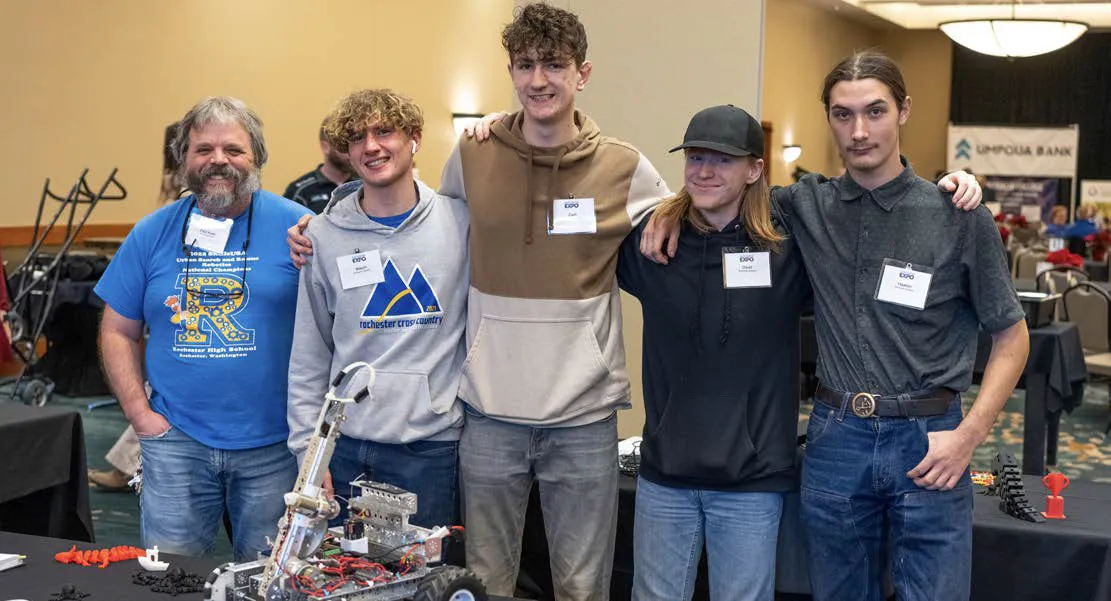
Photos Provided by Thurston County EDC
Members of Rochester High School’s STEM school program presented their robotics project.
Community members of the region encompassing Thurston, Lewis, Mason, Grays Harbor and Pacific counties gathered Dec. 5 at the Great Wolf Lodge for the 2024 Regional Economic Forecast & Innovation Expo.
At the event, which was hosted by the Thurston Economic Development Council and presented by PacMtn, business leaders, innovators, educators, exhibitors, and more participated in and engaged with discussions guided by the theme of “Building Regional Economic Prosperity.”
Lewis County was well represented on the Economic Development Leaders Panel with Richard DeBolt, Economic Alliance of Lewis County Executive Director. The panelist discussed how their individual strategies are complementary with each other, and how a regional strategy will project the area to one of vibrancy and prosperity.
Centralia College President Bob Mohrbacher was on the Regional College Panel “Driving Innovative Workforce Development for Future Economies.”
The Bioeconomy Development Opportunity Zone Initiative panel featured several Lewis County business experts, including Todd Chaput with the Economic Alliance of Lewis County, Lisa Goodman with The Benaroya Company, biofuel expert Bob Russell and DeBolt. The panel discussed certifying regional readiness for bio-based manufacturing and creating global connections with project developers, aiming to ignite an influx of clean energy opportunities.
Tribes
The event started off with breakfast and a welcome followed by presentations by regional tribes and their economic impact. Presenters included Kristen Davis of the Squaxin Island Tribe and Island Enterprises Inc., Frederick Cooper of the Shoalwater Bay Indian Tribe and Willapa Bay Enterprises Corp., Tony Enzler of the Quinault Indian Nation and Quinault Corporate Enterprises, Robert Hemmen of the Confederated Tribes of the Chehalis Reservation and Chehalis Tribal Enterprise, and Bob Iyall of the Nisqually Indian Tribe and Medicine Creek Enterprises Corp.
Together, the presenters spoke about their economic contributions to their respective counties, with many discussing future expansion plans and current project renovations.
Frederick Cooper discussed the ongoing renovations for the Shoalwater Bay Indian Tribe, which is overseeing a relocation to higher grounds for the tribe due to rising sea levels. The relocation is estimated to cost around $368 million for the tribe, but Cooper expressed optimism for the tribe’s business ventures, especially its Oyster Park, which is under construction.
Other representatives, such as Iyall, discussed the tribe’s history with the government, specifically that of the history of the Medicine Creek Treaty and its repercussions on tribal determination and land rights.
Iyall went over several tribal renovations and other “nontraditional” enterprises the tribe seeks out, such as its construction businesses and how initiatives like it ultimately create more wealth within the tribe and overall community.
“By building our economy and promoting wealth within our tribe, we create pathways to self-sufficiency and resilience. It allows us to fund critical services like health care, education, housing, infrastructure, and public safety,” Iyall said.
Multiple tribal members brought up tribal expansion in the cannabis industry, seafood industries and other “nontraditional” enterprises, in which tribal business leaders discussed growth.
“I’m often asked why tribes seek nontraditional forms of economic development,” Iyall said. “Gaming, tobacco sales, fuel enterprises, they can be considered nontraditional in the context of mainstream economic development models, but they’re strategic and culturally significant choices for Native American tribes.”
Panels
Following the Regional Tribal Nations Economic Impact presentation was a panel titled “Collaboration in Action for Economic Vibrancy,” where business leaders discussed how one can help build up their local economy and maintain it through collaboration.
After this panel, attendees split off to attend one of five different 50-minute breakout sessions, one of which included “Creative Catalysts: Unlocking Local Economic Potential Through Arts and Culture.” At this session, Annette Roth, a community development manager for the Washington State Arts Commission, got participants to think about different ways the arts can help grow a local economy in unexpected ways. By initiating even minor acts that encourage local artistic support can benefit a community’s economic growth and can encourage continued tourism, Roth said.
Following this breakout session was lunch keynoted by economist Bill Conerly. Conerly’s speech focused on economic predictions for 2025 amid the newest administration changes. Conerly got some laughs from the audience after declaring that 2025 could be a great year, since economists love when weird things happen.
His predictions forecasted the next two years and the potential impact of the presidential administration change that will occur in January. When looking at specifics like tariffs, taxes, and the country’s economic growth rate, Conerly’s predictions carefully considered varying factors like data, statistics, and previous tariff and economic policies that were enacted between 2017 and 2020.
Once the lunch period ended, attendees were encouraged to attend one of the last breakout sessions of the day. There were four sessions to choose from, with topics ranging from college leaders and programs for growing communities to health care in rural areas.
Finishing off the expo was one more discussion, “AI in Action: Transforming Economic Development One Year Later,” which revisited how AI tech has impacted economic development after it was under discussion at the event last year. When that conversation ended, attendees were encouraged to network and visit vendor booths with local organizations, nonprofits, schools, and more.
•••
The Economic Alliance of Lewis County contributed to this report.
Commerce grants credit for small businesses
Confederated Tribes of the Chehalis Reservation one of eight lenders awarded funding to help borrowers who otherwise may not be eligible for traditional bank loans
By Economic Alliance of Lewis County

Chehalis Tribal Loan Fund
“Brick by brick,” the Chehalis Tribal Loan Fund helps small businesses. The Tribe’s loan program was granted $95,676 by the Department of Commerce.
The Washington State Department of Commerce today named the first eight recipients of grants from a new Equitable Access to Credit program, including $95,676 for the Confederated Tribes of the Chehalis Reservation.
“We are deeply honored to be awarded this grant from the Washington state Department of Commerce, which will significantly enhance our ability to serve the members of the Confederated Tribes of the Chehalis Reservation and other Native American communities in Southwest Washington,” said Tamra J. Marlowe, Executive Director, Chehalis Tribal Loan Fund. “At the Chehalis Tribal Loan Fund, we are committed to breaking down financial barriers and fostering economic empowerment. Brick by brick, we are paving the way to financial empowerment through education, coaching and fair lending. This funding allows us to expand access to vital resources, promote financial literacy, and support entrepreneurship within these communities. Together, we are building a more inclusive and equitable future for all.”
The Chehalis Tribal Loan Fund was founded by the Chehalis Tribe in 2007, and in 2012 the U.S. Treasury department certified Chehalis Tribal Loan Fund as a Native Community Development Financial Institution.
Chehalis Tribal Loan Fund is located on the Confederated Tribes of the Chehalis Reservation. Their goal is to serve Chehalis Tribal members and the local community by providing access to educational and training opportunities to learn how to better manage personal finances, how to prepare for home ownership, or how to start or accelerate their business.
They focus on creating financial stability that develops into prosperity, which develops into generational prosperity.
The funding for the eight recipients will allow Community Development Financial Institutions to offer technical assistance services, small business training, loans and investments to aid borrowers who may not otherwise be eligible for traditional bank loans.
”Access to capital has long been at the top of the list of small business needs, especially in underserved communities,” said Commerce Director Mike Fong. “The Equitable Access to Credit program represents a unique funding mechanism to fuel small business growth and create new opportunities throughout the state.”
The inaugural grant awardees will receive a total of $1 million:
• Craft3 – $172,493
• Northwest Access Fund – $172,493
• MoFi – $172,493
• Business Impact NW – $149,494
• Enterprise Community Loan Fund – $137,994
• Chehalis Tribal Loan Fund – $95,676
• JST Capital – $66,237
• Rainier Valley Community Development Fund – $33,119
The Washington state Legislature created the Equitable Access to Credit program in 2023 through HB1015. The program awards grants to qualified lending institutions using funds generated by contributions from businesses in exchange for tax credits through the Department of Revenue.
Any business with state Business and Occupation tax liabilities can contribute to the program and receive a $1 for $1 tax credit.
”Craft3 is honored to be recognized with one of the inaugural awards from the Washington Equitable Access to Credit Program,” said Bruce Brooks, Craft3 president and interim CEO. “Small businesses provide 49.8% of jobs in Washington state and this grant will help us serve entrepreneurs who are working to build vibrant communities and who, too often, struggle to access the capital they need.”
The Equitable Access to Credit program encourages investment in communities that have historically lacked access to capital. At least 65% of the value of all grants awarded in any calendar year go to native grantees or grantees for services or investments, or both, in rural counties.
Deadline for 2024 tax deductible contributionsis Dec. 31
To date, Washington businesses have contributed $5.9 million to the program. The 2024 window for tax deductible contributions closes Dec. 31 and contributions for this year will be available in 2025. More information is available on the Washington State Department of Commerce Equitable Access to Credit program webpage.
Members Spotlight
Horse lover uses cryotherapy to heal, extends service to people
By The Economic Alliance of Lewis County
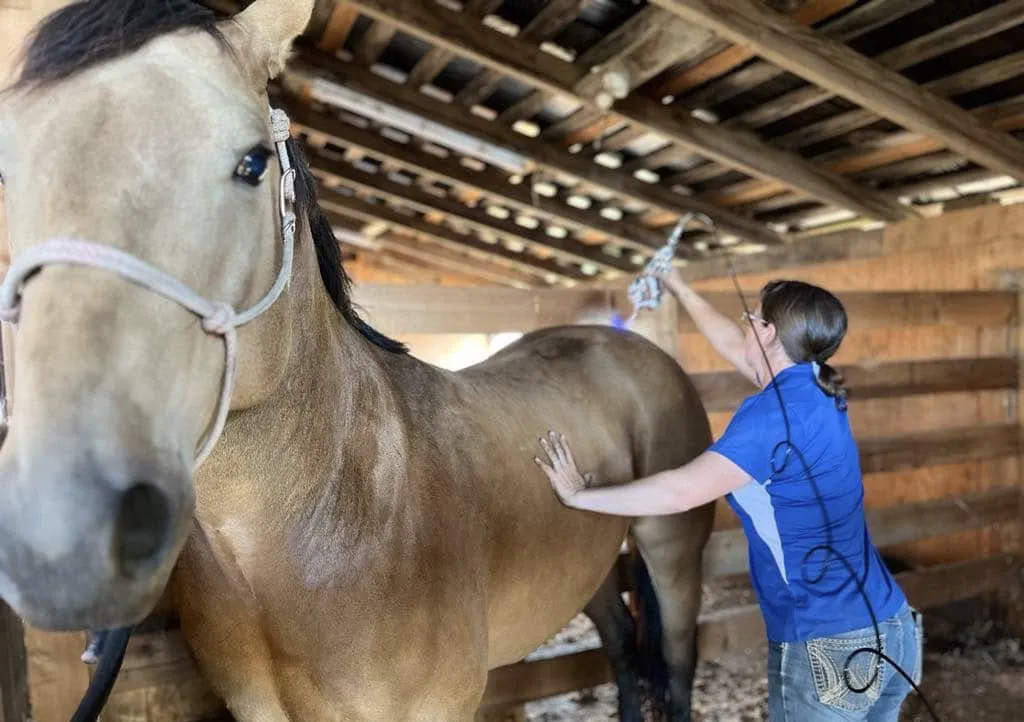
Photos Provided by Sirena Hays
Onalaskan Sirena Hays is a horse person, a barrel racer. She lives in Onalaska with her husband T.J. and two children, along with six horses.
Now, however, she is a whole-body healer with her new business Lighting H Performance Therapy, with an office in Chehalis, featuring targeted CO2 cold spray.
Sirena’s quarterhorse Maedae was feeling some aches and pains in its shoulder and joint in its lower leg. A traveling cryotherapy healer came to Lewis County, and Sirena brought in her horse.
“My horse was starting to balk at the gate and was starting to get stiff and bracing in our run and it was also starting to show up in our slow work,” she said. “I knew she needed something, so I drew out of the weekend race I had entered and got her scheduled to see the vet the following week. At that time, I had completely forgotten about the cryotherapy appointment I had her scheduled for through a good friend.”
The next day she saw Brady with Precision Equine Cryotherapy out of Oregon.
She had tried various remedies for her horses’ aches and pains with mixed results.
Brady worked on Maedae and before the session was even over her body was noticeably softer. The stiffness and tight muscles in her shoulders were soft.
“Brady told me, ‘You need to go make a run.’ I thought he was crazy, I didn’t want to run her again until after I saw the vet,” she said. “So Brady said, ‘just go ride her and see if you see improvement. If you do, consider running her.’ Long story short, I ended up running her that weekend, and to my surprise, there was no balking at the gate and she ran a tenth of a second off her fast time in that arena without asking her for more than just a cruise through because I wasn’t confident how she was feeling. I was blown away.”
Brady wasn’t local and available often in Lewis County, but he did explain how the whole body is connected and by using his program it will help reduce the need for injections.
Sirena decided to start her own cryotherapy, and decided to extend it to people.
Why Cryotherapy?
Sirena said when we start to feel aches and pains, that is a sign our muscles are lacking oxygen and blood flow. Cryotherapy uses state-of-the-art technology paired with ancient muscle recovery techniques to speed up the recovery and enhance performance.
Cryotherapy, also called Cold Therapy, has been used for centuries for overall health to treat injuries, and to recover from sports, such as athletes taking a cold bath.
Cold therapy stimulates your sympathetic nervous system, your body’s flight or fight response, causing a release of noradrenaline, a neurotransmitter and hormone that’s been shown to reduce pain signals in studies done on animals.
Several studies also have found cryotherapy lowered oxidative stress. It also lowered inflammation by reducing the production and release of pro-inflammatory substances while increasing the production and release of anti-inflammatory substances. Exposing the skin and muscle to cold causes your blood vessels to constrict and lower peripheral blood flow, which helps to decrease inflammation and swelling after an injury or exercise.
Whole-body cryotherapy is not a medical treatment. You don’t need a doctor to prescribe it for you. Athletes use cryotherapy to improve sports performance. An analysis of 28 studies on how cryotherapy affects recovery after strenuous exercise found it is better than other recovery methods, including active recovery and warm water therapy, to recover from muscle soreness and perceived recovery.
Another analysis of 52 studies found cryotherapy effectively reduced delayed-onset muscle soreness 24 hours after high-intensity exercise. It also improved the perception of recovery.
Cryoslimming
Freezing fat (cryoslimming) known medically as cryolipolysis, is one of the hottest trends in noninvasive body sculpting — that is, losing pockets of fat without needles, knives, or real downtime, something Sirena offers.
After a free consultation with Sirena, the treatment takes about 10 minutes per application. On average multiple applications are needed to cover an area.
While subtle changes are often seen immediately, results can be seen as soon as three weeks, with maximum benefit seen at approximately three months, she said.
Sirena also does cryotherapy aesthetics, which transforms the body throughout. She also performs cryofacials, where your fine lines and wrinkles fade away.
Another function she provides is tattoo rejuvenation, which brightens fading tattoos.
Sirena is thankful to have found cryotherapy.
“I’m over the moon, I love it,” she said. “It’s natural, helping the body to heal itself.”
•••
To contact Sirena, call (360) 304-9779.
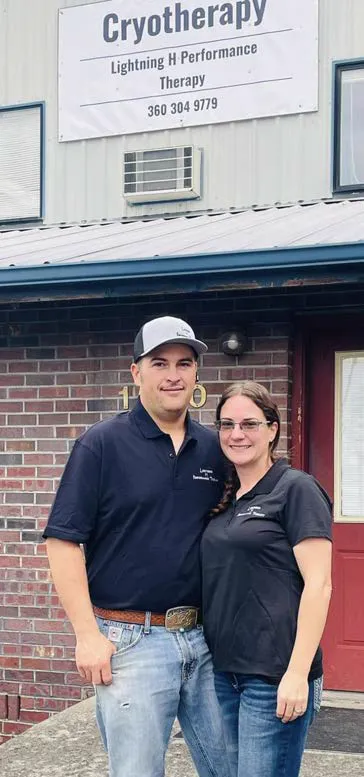
Sirena and T.J. Hays.
Director’s Corner
A whirlwind year ends with sadness as Daryl Lund passes away
Initiatives in this coming election need to be pondered
By Richard DeBolt
Executive Director — Economic Alliance of Lewis County
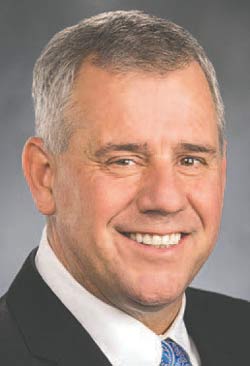
Richard DeBolt
Executive Director — Economic Alliance of Lewis County
It’s been a whirlwind year. It seems the older I get the faster time flies, but I am proud of all the Economic Alliance of Lewis County has accomplished this year.
One of our biggest projects was moving into a new office located 1209 Borthwick St., Centralia. We had an upbeat open house that was well attended.
We also had a busy year working with more than 250 businesses, helping them to expand or strengthen their operations. We also partner with hundreds of members in business, government and community groups to solve transportation, utility and regulatory problems.
We put on several events aimed at helping businesses thrive, such as the Bioeconomy Summit last month, the Economic Forecast forum in October, the Alliance Open Golf Tournament in September, supported the Inclusive Career Fair in April, put on the Women In Business Seminar in March, the Economics of Clean Energy forum in February, and also our sold-out annual banquet in February.
All this is impossible without my hard-charging staff.
When I participated in the Regional Economic Forecast & Innovation Expo leadership panel earlier this month, during a question and answer section, I was asked what was the secret to the success of the Alliance.
My answer was succinct and immediate: “it’s all due to my staff.”
Looking forward, former broadcast reporter and now political podcaster Brandi Kruse returns as the guest speaker for The Economic Alliance of Lewis County’s Annual Banquet set for Feb. 7 at the Jester Auto Museum and Event Center in Chehalis.
Kruse is quite the firecracker.
She’s a former Seattle TV reporter, who was asked to change her popular show by management. She quit instead, and now is an independent journalist producing the much-appreciated talk show “The Divide with Brandi Kruse.”
“I came to the conclusion that if I wanted to do my best work — my best work for the public — I didn’t believe I could work for corporate media and work for the public at the same time,” she told Seattle’s KIRO Radio, as reported in a past Alliance Economic Report.
If you want to hear her common sense approach to Washington state politics, you can hear her at www.patreon.com/undivided.
“I quit my job in corporate media to start a platform where I could be unfiltered, unrelenting, and honest. Too much is at stake to hold back,” she said. “[un]Divided is more than a place to talk politics, it is a mission.”
You’re not going to want to miss her when she comes to Lewis County. There are still a few tickets available. To register, call Dolly at 360-748-0114.
Finally, we lost a dear friend to Chehalis and Lewis County last week when Chehalis City Councilor Daryl Lund passed away.
Daryl was a thoughtful, generous person who always had a smile to offer. He was humble and unassuming, but could move mountains with his positive energy.
Daryl was a volunteer firefighter, and served the city council starting at the young age of 23. He was just selected as mayor pro tem. He was also active in the Centralia-Chehalis Chamber of Commerce and the Chehalis-Centralia Railroad & Museum, and as a Port of Chehalis commissioner.
He bought and renovated the Chehalis Theater and at one time owned the movie house at Yard Birds.
Daryl’s support and activities in Lewis County left a long-lasting mark, but it is his personality and friendliness that will remain with us.
I believe he is up in heaven, still influencing for Chehalis from above.
The path to seven figures begins with free ScaleUp Business Training
By The Economic Alliance of Lewis County
ScaleUp Business Training helps established businesses increase profitability, build capacity, and spur growth.
- Do you feel like you have no time outside of working in your business?
- Are you spending too much time on low profit activities?
- Have high maintenance clients taken over your schedule?
- Are you thinking of selling your business?
- Need help interpreting your fiscal drivers?
This powerful program will give you the tools necessary to take your time back, break through the profit plateau, create new sources of revenue, and help you to work on your business rather than in your business.
ScaleUp is a flexible time commitment and is delivered online through the ScaleUp online learning environment, live training sessions with roundtable discussion, and weekly study hall mentorship hours. Graduates of the program will also retain continued access to alumni resources, which include all of the above and much more.
Their trainers are highly qualified and come with years of practical experience building and scaling businesses and helping others do the same.
This program is most beneficial for established business owners, with two or more years experience owning and operating a small business, and are currently based in Washington state.
This program which normally costs $1,599 is provided at no cost to Washington state businesses through June 30, 2025, thanks to ongoing support from the Washington Department of Commerce.
Dates:
- Tuesdays: 9 to 10:30 a.m.Jan. 21 – March 18
- Wednesdays: 6 – 7:30 p.m.Jan. 22 – March 19
- Thursdays: 9 to 10:30 a.m.Jan. 23 – March 20
To register, go to mystartup365.com/programs/scaleup

Bishop Rd, Chehalis • $8.4 Million
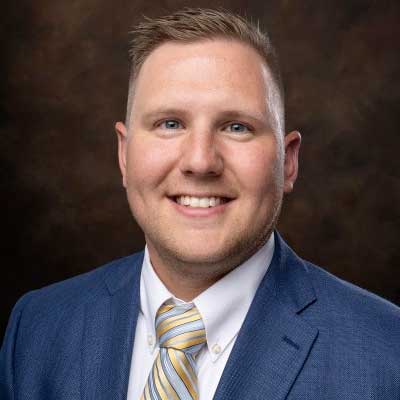
Eric Sonnenberg
Economic Alliance of Lewis County External Relations Manager

